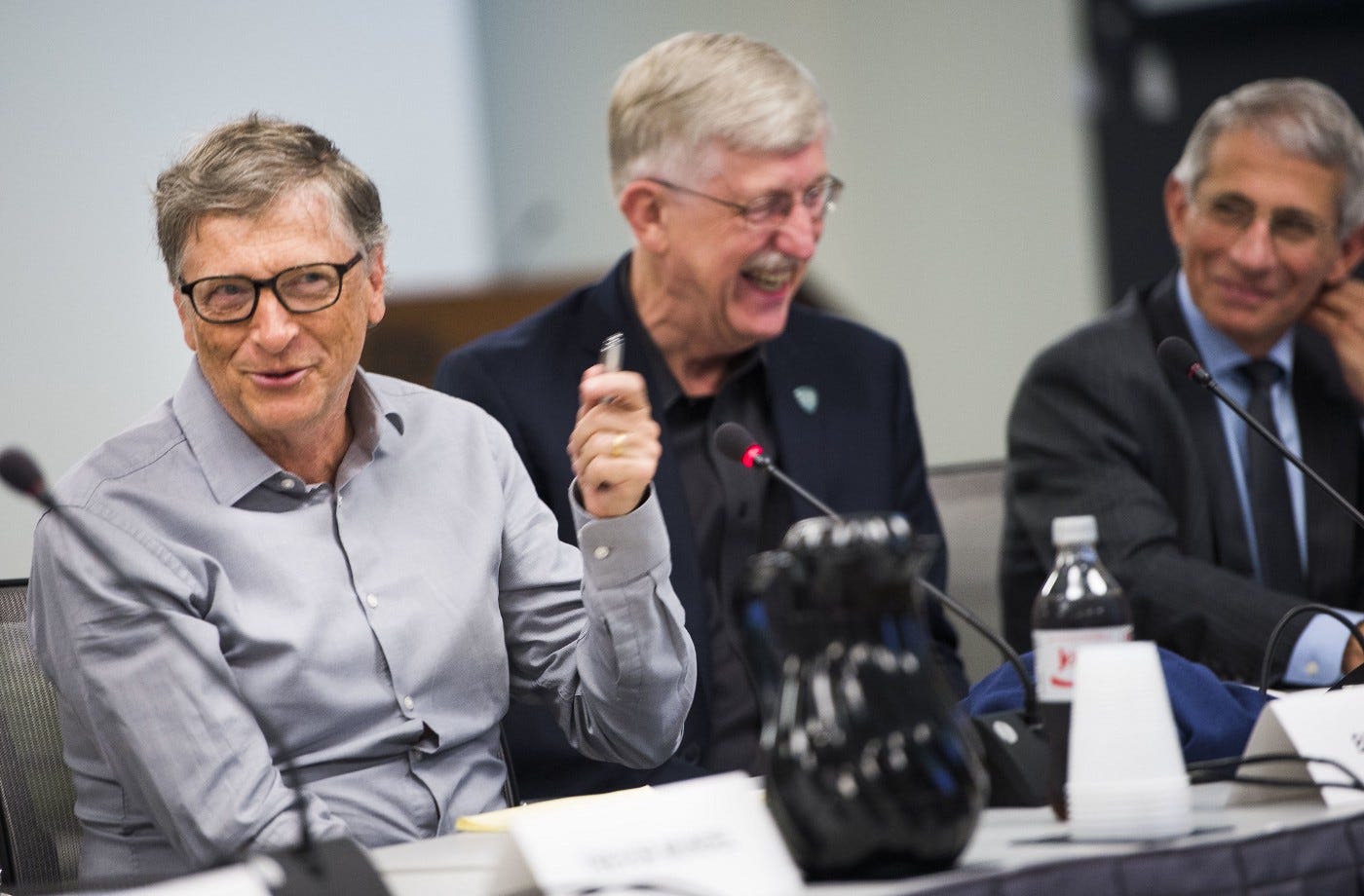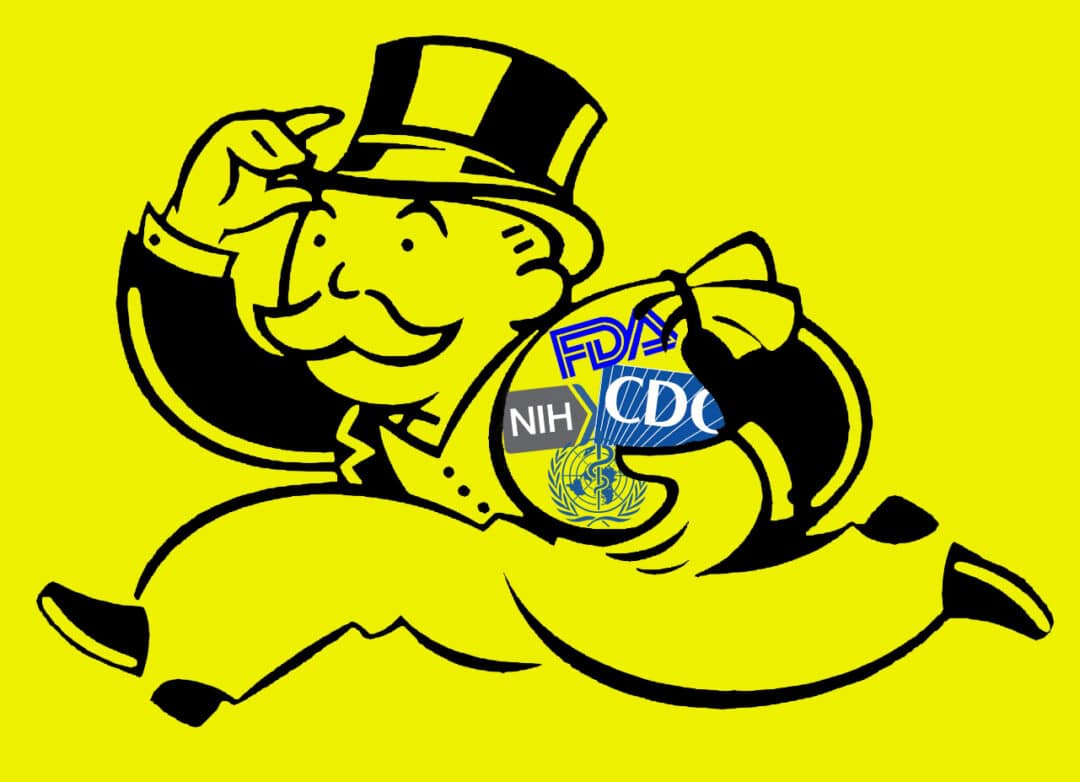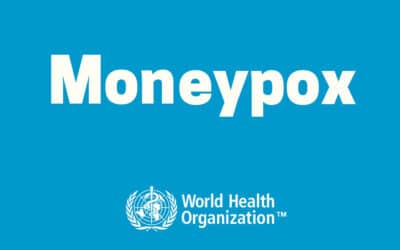
Backing the Big Four: Big Pharma and the FDA, WHO, NIH, CDC
by Rebecca Strong Apr 8,2022
I know what you’re thinking. Big pharma is amoral and the FDA’s devastating slips are a dime a dozen — old news. But what about agencies and organizations like the National Institutes of Health (NIH), World Health Organization (WHO), and Centers for Disease Control & Prevention (CDC)? Don’t they have an obligation to provide unbiased guidance to protect citizens? Don’t worry, I’m getting there.
The WHO’s guidance is undeniably influential across the globe. For most of this organization’s history, dating back to 1948, it could not receive donations from pharmaceutical companies — only member states. But that changed in 2005when the WHO updated its financial policy to permit private money into its system. Since then, the WHO has accepted many financial contributions from big pharma. In fact, it’s only 20% financed by member states today, with a whopping 80% of financing coming from private donors. For instance, The Bill and Melinda Gates Foundation (BMGF) is now one of its main contributors, providing up to 13% of its funds — about $250–300 million a year. Nowadays, the BMGF provides more donations to the WHO than the entire United States.
Dr. Arata Kochi, former head of WHO’s malaria program, expressed concerns to director-general Dr. Margaret Chan in 2007 that taking the BMGF’s money could have “far-reaching, largely unintended consequences” including “stifling a diversity of views among scientists.”
“The big concerns are that the Gates Foundation isn’t fully transparent and accountable,” Lawrence Gostin, director of WHO’s Collaborating Center on National and Global Health Law, told Devex in an interview. “By wielding such influence, it could steer WHO priorities … It would enable a single rich philanthropist to set the global health agenda.”

Bill Gates, Francis Collins, Anthony Fauci. Photo credit: National Institutes of Health
Take a peek at the WHO’s list of donors and you’ll find a few other familiar names like AstraZeneca, Bayer, Pfizer, Johnson & Johnson, and Merck.
The NIH has the same problem, it seems. Science journalist Paul Thacker, who previously examined financial links between physicians and pharma companies as a lead investigator of the United States Senate Committee, wrote in The Washington Post that this agency “often ignored” very “obvious” conflicts of interest. He also claimed that “its industry ties go back decades.” In 2018, it was discovered that a $100 million alcohol consumption study run by NIH scientists was funded mostly by beer and liquor companies. Emails proved that NIH researchers were in frequent contact with those companies while designing the study — which, here’s a shocker — were aimed at highlighting the benefits and not the risks of moderate drinking. So, the NIH ultimately had to squash the trial.
And then there’s the CDC. It used to be that this agency couldn’t take contributions from pharmaceutical companies, but in 1992 they found a loophole: new legislation passed by Congress allowed them to accept private funding through a nonprofit called the CDC Foundation. From 2014 through 2018 alone, the CDC Foundation received $79.6 million from corporations like Pfizer, Biogen, and Merck.
Of course, if a pharmaceutical company wants to get a drug, vaccine, or other product approved, they really need to cozy up to the FDA. That explains why in 2017, pharma companies paid for a whopping 75% of the FDA’s scientific review budgets, up from 27% in 1993. It wasn’t always like this. But in 1992, an act of Congress changed the FDA’s funding stream, enlisting pharma companies to pay “user fees,” which help the FDA speed up the approval process for their drugs.
A 2018 Science investigation found that 40 out of 107 physician advisors on the FDA’s committees received more than $10,000 from big pharma companies trying to get their drugs approved, with some banking up to $1 million or more. The FDA claims it has a well-functioning system to identify and prevent these possible conflicts of interest. Unfortunately, their system only works for spotting payments before advisory panels meet, and the Science investigation showed many FDA panel members get their payments after the fact. It’s a little like “you scratch my back now, and I’ll scratch your back once I get what I want” — drug companies promise FDA employees a future bonus contingent on whether things go their way.
Here’s why this dynamic proves problematic: a 2000 investigation revealed that when the FDA approved the rotavirus vaccine in 1998, it didn’t exactly do its due diligence. That probably had something to do with the fact that committee members had financial ties to the manufacturer, Merck — many owned tens of thousands of dollars of stock in the company, or even held patents on the vaccine itself. Later, the Adverse Event Reporting System revealed that the vaccine was causing serious bowel obstructions in some children, and it was finally pulled from the U.S. market in October 1999.
Then, in June of 2021, the FDA overruled concerns raised by its very own scientific advisory committee to approve Biogen’s Alzheimer’s drug Aduhelm — a move widely criticized by physicians. The drug not only showed very little efficacy but also potentially serious side effects like brain bleeding and swelling, in clinical trials. Dr. Aaron Kesselheim, a Harvard Medical School professor who was on the FDA’s scientific advisory committee, called it the “worst drug approval” in recent history, and noted that meetings between the FDA and Biogen had a “strange dynamic” suggesting an unusually close relationship. Dr. Michael Carome, director of Public Citizen’s Health Research Group, told CNNthat he believes the FDA started working in “inappropriately close collaboration with Biogen” back in 2019. “They were not objective, unbiased regulators,” he added in the CNN interview. “It seems as if the decision was preordained.”
That brings me to perhaps the biggest conflict of interest yet: Dr. Anthony Fauci’s NIAID is just one of many institutes that comprises the NIH — and the NIH owns half the patent for the Moderna vaccine — as well as thousands more pharma patents to boot. The NIAID is poised to earn millions of dollars from Moderna’s vaccine revenue, with individual officials also receiving up to $150,000 annually.
Operation Warp Speed
In December of 2020, Pfizer became the first company to receive an emergency use authorization (EUA) from the FDA for a COVID-19 vaccine. EUAs — which allow the distribution of an unapproved drug or other product during a declared public health emergency — are actually a pretty new thing: the first one was issued in 2005 so military personnel could get an anthrax vaccine. To get a full FDA approval, there needs to be substantial evidence that the product is safe and effective. But for an EUA, the FDA just needs to determine that it may be effective. Since EUAs are granted so quickly, the FDA doesn’t have enough time to gather all the information they’d usually need to approve a drug or vaccine.
Pfizer CEO and chairman Albert Bourla has said his company was “operating at the speed of science” to bring a vaccine to market. However, a 2021 report in The BMJ revealed that this speed might have come at the expense of “data integrity and patient safety.” Brook Jackson, regional director for the Ventavia Research Group, which carried out these trials, told The BMJ that her former company “falsified data, unblinded patients, and employed inadequately trained vaccinators” in Pfizer’s pivotal phase 3 trial. Just some of the other concerning events witnessed included: adverse events not being reported correctly or at all, lack of reporting on protocol deviations, informed consent errors, and mislabeling of lab specimens. An audio recording of Ventavia employees from September 2020 revealed that they were so overwhelmed by issues arising during the study that they became unable to “quantify the types and number of errors” when assessing quality control. One Ventavia employee told The BMJ she’d never once seen a research environment as disorderly as Ventavia’s Pfizer vaccine trial, while another called it a “crazy mess.”
Over the course of her two-decades-long career, Jackson has worked on hundreds of clinical trials, and two of her areas of expertise happen to be immunology and infectious diseases. She told me that from her first day on the Pfizer trial in September of 2020, she discovered “such egregious misconduct” that she recommended they stop enrolling participants into the study to do an internal audit.
“To my complete shock and horror, Ventavia agreed to pause enrollment but then devised a plan to conceal what I found and to keep ICON and Pfizer in the dark,” Jackson said during our interview. “The site was in full clean-up mode. When missing data points were discovered the information was fabricated, including forged signatures on the informed consent forms.”
A screenshot Jackson shared with me shows she was invited to a meeting titled “COVID 1001 Clean up Call” on Sept. 21, 2020. She refused to participate in the call.
Jackson repeatedly warned her superiors about patient safety concerns and data integrity issues.
“I knew that the entire world was counting on clinical researchers to develop a safe and effective vaccine and I did not want to be a part of that failure by not reporting what I saw,” she told me.
When her employer failed to act, Jackson filed a complaint with the FDA on Sept. 25, and Ventavia fired her hours later that same day under the pretense that she was “not a good fit.” After reviewing her concerns over the phone, she claims the FDA never followed up or inspected the Ventavia site. Ten weeks later, the FDA authorized the EUA for the vaccine. Meanwhile, Pfizer hired Ventavia to handle the research for four more vaccine clinical trials, including one involving children and young adults, one for pregnant women, and another for the booster. Not only that, but Ventavia handled the clinical trials for Moderna, Johnson & Johnson, and Novavax. Jackson is currently pursuing a False Claims Act lawsuitagainst Pfizer and Ventavia Research Group.
Last year, Pfizer banked nearly $37 billion from its COVID vaccine, making it one of the most lucrative products in global history. Its overall revenues doubled in 2021 to reach $81.3 billion, and it’s slated to reach a record-breaking $98-$102 billion this year.
“Corporations like Pfizer should never have been put in charge of a global vaccination rollout, because it was inevitable they would make life-and-death decisions based on what’s in the short-term interest of their shareholders,” writes Nick Dearden, director of Global Justice Now.
As previously mentioned, it’s super common for pharmaceutical companies to fund the research on their own products. Here’s why that’s scary. One 1999 meta-analysis showed that industry-funded research is eight times less likely to achieve unfavorable results compared to independent trials. In other words, if a pharmaceutical company wants to prove that a medication, supplement, vaccine, or device is safe and effective, they’ll find a way.
With that in mind, I recently examined the 2020 study on Pfizer’s COVID vaccineto see if there were any conflicts of interest. Lo and behold, the lengthy attached disclosure form shows that of the 29 authors, 18 are employees of Pfizer and hold stock in the company, one received a research grant from Pfizer during the study, and two reported being paid “personal fees” by Pfizer. In another 2021 study on the Pfizer vaccine, seven of the 15 authors are employees of and hold stock in Pfizer. The other eight authors received financial support from Pfizer during the study.
As of the day I’m writing this, about 64% of Americans are fully vaccinated, and 76% have gotten at least one dose. The FDA has repeatedly promised “full transparency” when it comes to these vaccines. Yet in December of 2021, the FDA asked for permission to wait 75 years before releasing information pertaining to Pfizer’s COVID-19 vaccine, including safety data, effectiveness data, and adverse reaction reports. That means no one would see this information until the year 2096 — conveniently, after many of us have departed this crazy world. To recap: the FDA only needed 10 weeks to review the 329,000 pages worth of data before approving the EUA for the vaccine — but apparently, they need three-quarters of a century to publicize it.
In response to the FDA’s ludicrous request, PHMPT — a group of over 200 medical and public health experts from Harvard, Yale, Brown, UCLA, and other institutions — filed a lawsuit under the Freedom of Information Act demanding that the FDA produce this data sooner. And their efforts paid off: U.S. District Judge Mark T. Pittman issued an order for the FDA to produce 12,000 pages by Jan. 31, and then at least 55,000 pages per month thereafter. In his statement to the FDA, Pittman quoted the late John F. Kennedy: “A nation that is afraid to let its people judge the truth and falsehood in an open market is a nation that is afraid of its people.”
As for why the FDA wanted to keep this data hidden, the first batch of documentation revealed that there were more than 1,200 vaccine-related deaths in just the first 90 days after the Pfizer vaccine was introduced. Of 32 pregnancies with a known outcome, 28 resulted in fetal death. The CDC also recently unveiled data showing a total of 1,088,560 reports of adverse eventsfrom COVID vaccines were submitted between Dec. 14, 2020, and Jan. 28, 2022. That data included 23,149 reports of deaths and 183,311 reports of serious injuries. There were 4,993 reported adverse events in pregnant women after getting vaccinated, including 1,597 reports of miscarriage or premature birth. A 2022 study published in JAMA, meanwhile, revealed that there have been more than 1,900 reported cases of myocarditis — or inflammation of the heart muscle — mostly in people 30 and under, within 7 days of getting the vaccine. In those cases, 96% of people were hospitalized.
“It is understandable that the FDA does not want independent scientists to review the documents it relied upon to license Pfizer’s vaccine given that it is not as effective as the FDA originally claimed, does not prevent transmission, does not prevent against certain emerging variants, can cause serious heart inflammation in younger individuals, and has numerous other undisputed safety issues,” writes Aaron Siri, the attorney representing PHMPT in its lawsuit against the FDA.
Siri told me in an email that his office phone has been ringing off the hook in recent months.
“We are overwhelmed by inquiries from individuals calling about an injury from a COVID-19 vaccine,” he said.
By the way — it’s worth noting that adverse effects caused by COVID-19 vaccinations are still not covered by the National Vaccine Injury Compensation Program. Companies like Pfizer, Moderna, and Johnson & Johnson are protected under the Public Readiness and Emergency Preparedness (PREP) Act, which grants them total immunity from liability with their vaccines. And no matter what happens to you, you can’t sue the FDA for authorizing the EUA, or your employer for requiring you to get it, either. Billions of taxpayer dollars went to fund the research and development of these vaccines, and in Moderna’s case, licensing its vaccine was made possible entirely by public funds. But apparently, that still warrants citizens no insurance. Should something go wrong, you’re basically on your own.
Subscribe to Down the Rabbit Hole
Contact Us
Follow Us
Privacy Policy
Sitemap
© 2024 FM Media Enterprises, Ltd.




